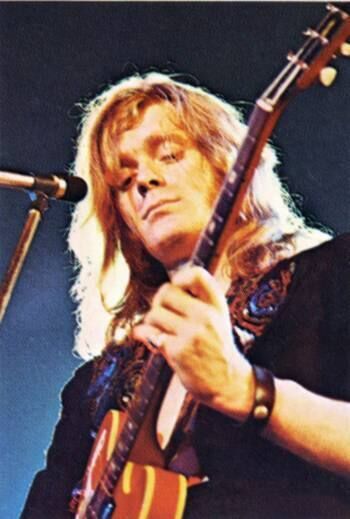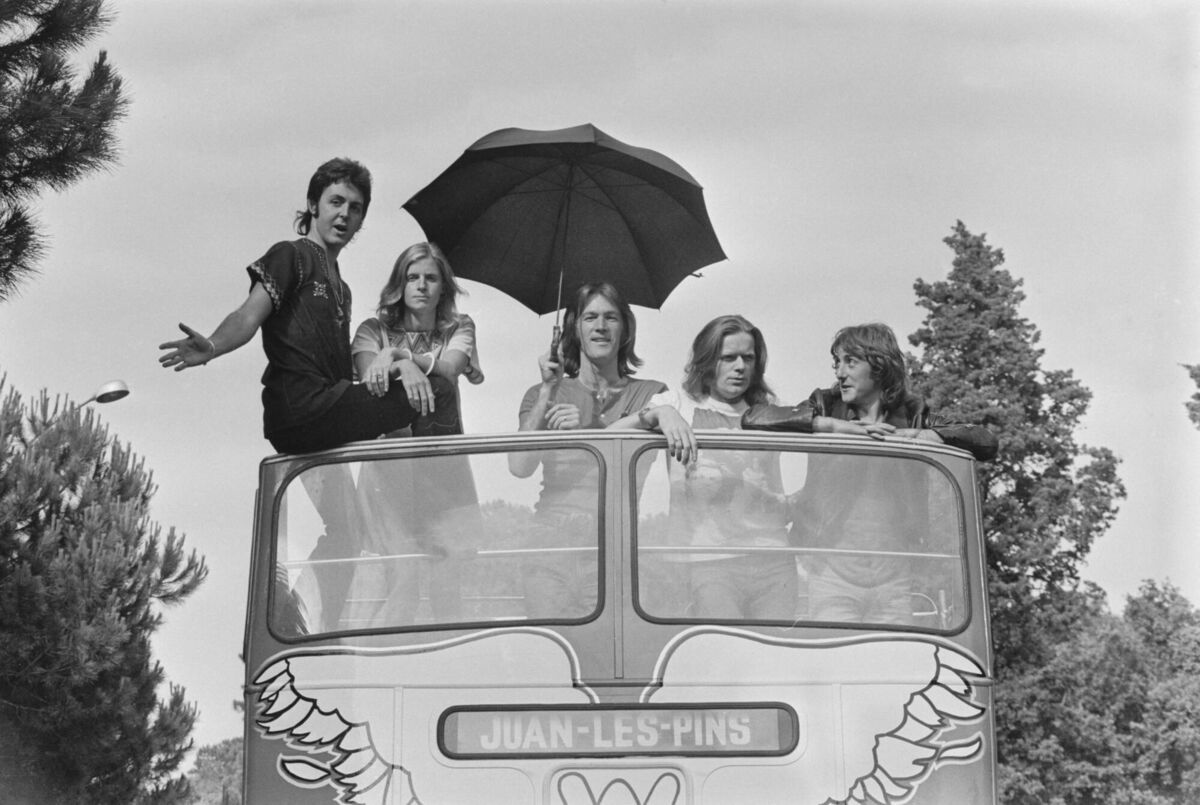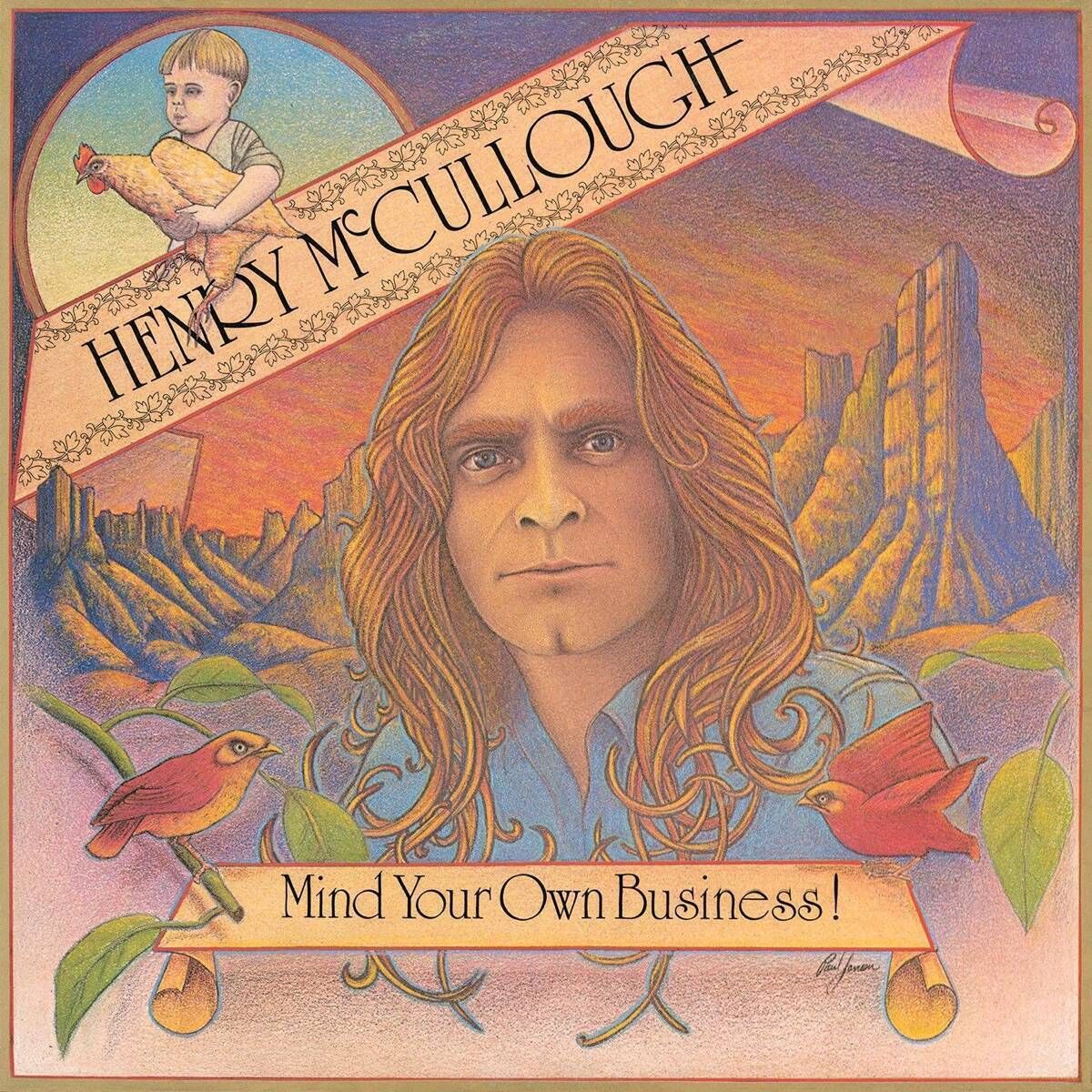Ireland In 50 Albums, No 35: Mind Your Own Business, by Henry McCullough (1975)

Mind Your Own Business! by Henry McCullough came two years after the Co Derry guitarist had left Wings.
Henry McCullough is the only Irish person who played at Woodstock in 1969. McCullough, who was born in Portstewart, Co Derry, in 1943, was lead guitarist for Joe Cocker’s backing group, The Grease Band. It’s McCullough singing falsetto and doing guitar solos during the band’s show-stealing version of With a Little Help from My Friends, with Cocker accompanying him maniacally on air guitar.
McCullough was a gifted guitarist, one of the finest during a time when side streets in London were scrawled with “Clapton is God” graffiti. Eamon Carr, drummer and lyricist with Horslips, and a friend and collaborator with McCullough, remembers going as much as five times a week to watch McCullough’s psychedelic band The People play in venues around Dublin in 1967.
“Henry was world class,” says Carr. “At the time, and this was a function of my misspent youth, I regarded Henry in a pantheon along with Eric Clapton, Jeff Beck, Jimmy Page, Rory Gallagher, and, of course, Jimi Hendrix, who spotted Henry playing in a London nightclub, and went to his manager Chas Chandler, who previously played with The Animals, and said, ‘You’ve got to see these guys.’ Henry’s playing was spectacular.”

Under Chas Chandler’s wing, McCullough’s band toured with the likes of the Jimi Hendrix Experience, Soft Machine and Pink Floyd until McCullough had to leave a North American tour abruptly in 1969 due to “visa problems”, the official version claims, although rumour has it he was caught carrying some dope across the Canadian border.
Several years later, McCullough’s spoken words surfaced on Pink Floyd’s Dark Side of the Moon album at the end of their Money track: "I don't know; I was really drunk at the time," a reference to a quarrel McCullough had the previous night with his wife. McCullough was recording an album at Abbey Road Studios with Paul McCartney’s band Wings at the time.
Two days after Joe Cocker’s Grease Band broke up in January 1972, McCullough got a phone call asking him to come to rehearsals with Wings. McCartney was stunned by his guitar playing at the audition, and enrolled him.
McCullough, a Protestant and apolitical, did his first recording with Wings the following month on the band’s protest single, Give Ireland Back to the Irish. It didn’t augur well. McCullough later blotted his copybook when he suggested the band could find a better keyboard player than Linda McCartney, the boss’s wife. He had to back off “real quick” from that idea.
McCullough’s time with Wings is chiefly remembered for his improvised guitar solo on the band’s first #1 single, My Love, recorded in one take in front of a George Martin orchestra, a piece of divine inspiration that ensured a lifelong bond with McCartney, who decades later fired off a postcard to McCullough: “Keep playing those silver strings, Henry!”

McCullough left Wings in August 1973, fed up with having to wear tartan jackets and doing comedy arrangements like Mary Had a Little Lamb. “He had his moment of glory with Wings and then he left. Typical Henry. There’s a pattern here. Henry was quite laidback. He didn't have ambition. He was a muso, a musician. He enjoyed playing, his old timey and his gospel,” says Carr.
The American John Jansen, who got to know McCullough through their mutual friend, the singer-songwriter Frankie Miller, produced McCullough’s first solo album, Mind Your Own Business! He adds extra insight into McCullough’s personality and wayward genius:
“Henry was a good storyteller. He had an ability – and maybe this is an Irish thing – to spin a story and I'd buy into it hook, line and sinker. Later, I’d realise it was bullshit. He got me every time. He was warm and a good friend until he had too much to drink, and then he was a different person. The key was to make sure he didn’t have too much to drink! Henry was a complicated guy. Most musicians that rise up the ranks are fairly consistent but Henry was not consistent. He would have a day where his playing was really off, but when he had an ‘on day’ there was nobody like him.”
McCullough got commissioned by George Harrison’s label, Dark Horse Records, to cut the Mind Your Own Business! album in 1975 at The Who’s recording studio, Ramport Studios, in London’s Battersea district. The title track was a Hank Williams cover. McCullough wrote the lyrics for the album’s other nine tracks, which have, as Carr points out, a Robbie Robertson and the Band-like feeling of top-line rock musicians luxuriating in each other’s company, enjoying the groove, amidst beautiful arrangements.
“There’s a track Baby What You Do to Me on the first side. It has brass on it and a hint of reggae, but it's mainly an Allen Toussaint sound, a rhythm-and-blues musician from New Orleans. These were the albums fellas were listening to in crash pads in the 70s, lying on their Afghan cushions, and, of course, The Band was a big influence. At the time, I felt slightly disappointed there were no wild guitar solos by Henry because he was such a fantastic guitarist, but that wasn't what he was interested in with this record.”
Rhythm guitarist Neil Hubbard, who performed with Brian Ferry at Live Aid in 1985, played on several tracks on the album. “The first time I met Henry was in the late 60s at a Grease Band gig with Joe Cocker,” says Hubbard. “I was just knocked out by Henry's playing. He was the greatest lead guitarist I'd ever seen. I loved the way Henry worked. He never needed to have anything planned. His writing, singing and playing were all magical. He'd always seize the moment. He was so spontaneous.” Spontaneity is a word that both Jansen and Carr also use when trying to explain McCullough’s modus operandi. Jansen gives an example: “Henry turned up one day with these horn players he met at a bar. They got into a conversation. They said, ‘We play horns.’ Henry goes, ‘Oh great. Grab your horns and come with me.’ All of a sudden we're doing horns on Baby What You Do to Me with these guys he’d just met.”
- For the ongoing series of Ireland In 50 Albums, see https://www.irishexaminer.com/maintopics/ireland-in-50-albums_topic-5183966.html

The album didn’t have an obvious radio-friendly track, but the bigger problem was it was beset by misfortune. When it was released, George Harrison was in court, in the middle of losing a “subconscious plagiarism” battle, and ordered to pay over a million dollars from the earnings of his song, My Sweet Lord, to the publisher of The Chiffons 1963 hit single He’s So Fine. His label Dark Horse Records folded. McCullough never got a chance to tour Mind Your Own Business!, as a result, nor did he get to make a follow-up album.
After an extraordinary decade, McCullough’s career never again reached the same heights. In 1977, he briefly joined Dr. Feelgood, and worked as a session musician on records with Marianne Faithfull and Donovan, among others, and continued to record and perform with various line-ups, releasing Poor Man’s Moon in 2008, an album with lyrics written by Carr. Having lived in Northern Ireland since the 1980s, he suffered a heart attack in 2012, which he never fully recovered from, and died in 2016.
“At his funeral, Paddy Goodwin gave a beautiful eulogy in which he named an American Native Indian that Henry had an affinity with, almost like a spirit guide,” says Carr. “Henry had that sort of backwoodsman thing. Whenever I listen to Mind Your Own Business! I can get that feeling.”


